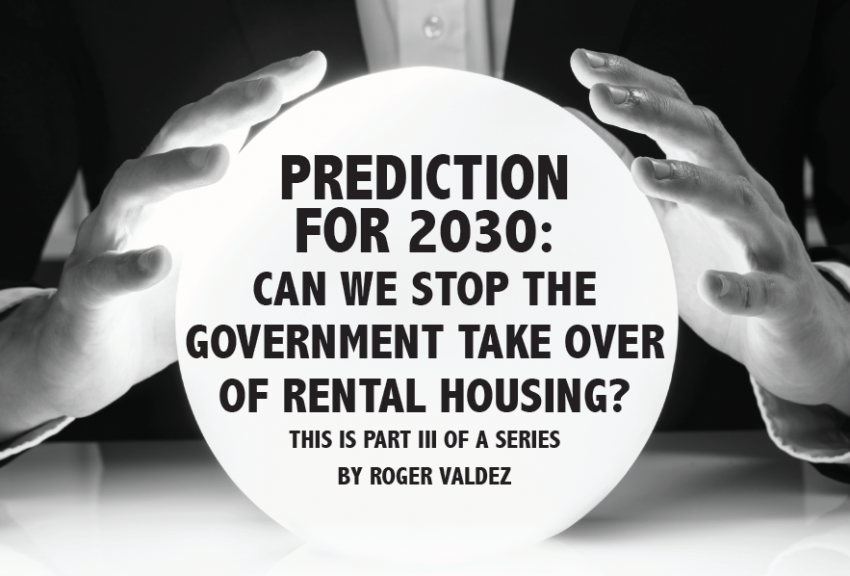Prediction For 2030: Can We Stop The Government Take Over Of Rental Housing?

Prediction For 2030: Can We Stop The Government Take Over Of Rental Housing?
(This is Part 3 and the Final Article in a Series)
By Roger Valdez
After years of working on housing policy, I have found myself frequently referring to Virgil’s Aeneid, the story of the journey of Aeneas from Troy to Italy where he would be the founder of Rome. Like many epics – the Pentateuch, the Mahabharata, or Gilgamesh – the plot is riveting, but so are the images that become cultural touchstones. The Trojan Horse is one of these. Barbara Tuchman dedicated an entire chapter of her book, March of Folly, to the horse as an emblem of humanity’s addiction “to pursuing policy contrary to self-interest.” The government takeover of housing would be just such a policy. But how do we stop the wheeling of this Trojan Horse into the center of our economy?
I’m not going to argue against the notion that housing should be de-commodified and controlled by the state other than to say that even in such a world, without an absolute, stable, and perpetual equilibrium between supply of housing units and demand for them, high prices would simply be replaced with rationing and long waits for “free” housing. This seems to be enough. Except that, as I’ve pointed out before, the desire to seize private housing isn’t about housing at all, but political power.
If we’re going to avoid this folly, we have to do four things now. First, people who finance, develop, build, and manage housing need to internalize what they should know and believe about value and markets and who they truly are. We must not avoid the term “free market” but embrace it. But what is it that we mean when we use the term and what do we believe about how a market works?
Each human being has unique value, and benefits most from that value when able to exchange it with others in a mutually beneficial way. A market allows a person to meet needs with another person’s strengths. This free exchange of value isn’t the basis of an economic ideology; it is the basis of civilization. Rules and laws are just when they make that value exchange more predictable and humane.
However, when rules add costs and generate inflation that limit opportunity and innovation, and disproportionately consume the savings and wages of the poor, those rules are unjust and unfair. We should never subsidize rule-generated inflation with exactions that make inflation worse by adding costs. And finally, we believe that compassion between people is best when it is direct and as efficient as possible, and not through coercion.
And who are the people that finance, develop, build, and manage housing in the United States? They are not villains or the “bad guys.” It’s just the opposite, they are the “good guys.” Even the advocates for socialized housing agree, that people who make a living from housing – from bankers and lawyers to mom and pop landlords and construction workers – create over 90 percent of the supply of housing in the United States. If you live in some kind of housing, it has its origins in the market, whether in the form or tax credits syndicated for the purpose of building a subsidized unit, or from the labor of a for profit contractor that poured its foundations.
It might seem strange that the first step in opposing the disastrous outcome of state run housing would be creedal, but the dominant paradigm that has allowed the gross misrepresentation of housing data and the development of a bribery culture in housing is based on the broad acceptance that market produced housing is somehow exploitative and that the people who earn a living from housing are avaricious. Greed is a character trait, not a business model. If people who want to oppose government run housing don’t believe this at their core, we’re doomed.
I’ve already laid out the second, third, and fourth steps elsewhere. First, we need to organize ourselves into a coherent force that can counter at every step misleading data about eviction, for example, which lead to bad housing policy. Then we need to propose efficient and compassionate solutions to housing price problems for people with less money, like giving them cash for rent rather than putting them on a waiting list for subsidized housing. Finally, we simply must invest in understanding how we tap people’s common sense and intuitive understanding that housing price problems are wholly the function of government limits on the production of housing.
The last paragraph of Tuchman’s classic says it best and elegantly:
“Yet the feasible alternative — that of destroying the Horse — is always open. Capys the Elder advised it before Laocoön’s warning, and Cassandra afterward. Notwithstanding the frequent references in the epic to the fall of Troy being ordained, it was not fate but free choice which took the Horse within the walls. ‘Fate’ as a character in legend represents the fulfillment of man’s expectations of himself.”
Roger Valdez is a public policy expert in the areas of education, health, and housing. Most recently he served as housing director at a large regional non-profit organization. He has been an advocate for progressive supply side solutions to housing scarcity. The opinions expressed in this article are those of its author and not necessarily the opinions of the Apartment Association of Greater Los Angeles. This article is being reprinted with permission from the author and was previously published by Forbes.



